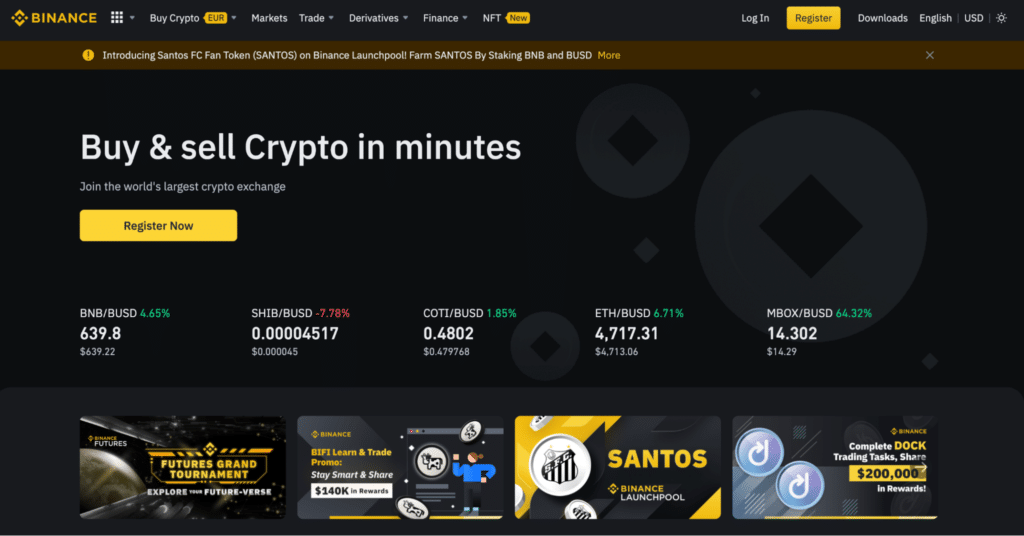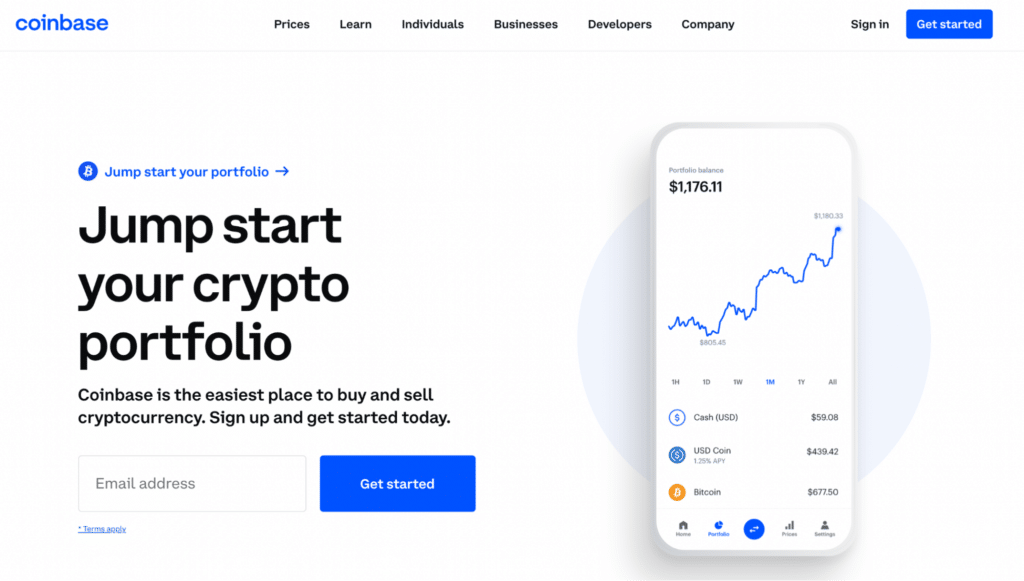Despite the growing prevalence of cryptocurrencies, many have a steep learning curve to navigate this intriguing market. There are many options in the range of cryptocurrencies, exchanges, and other related services.
To get started, we will focus on the top crypto trading platforms as they form the industry’s core. Once you better understand this aspect, it’s easier to comprehend the other applications.
By the time you’ve finished reading this article, you should know more about the top crypto trading platforms to begin your journey. So, without further ado, let’s get started.
How to trade in cryptocurrency
There are two primary avenues in how to trade in cryptocurrency. The first is speculation-based, where you trade the prices of such assets through derivatives.
This way involves some level of margin, and traders don’t need to own the underlying coin. The second method is buying the actual cryptocurrencies, which you can treat as an investment or transact with for personal or business purposes.
What are crypto trading platforms?
These are platforms allowing for the exchange of numerous crypto-to-crypto, fiat-to-crypto, or crypto-to-fiat markets. They work by having an order book, a ‘matching engine’ connecting the orders of buyers and sellers.
So, whenever you want to buy a cryptocurrency, the platform will match that order with another client willing to sell that coin or source the order from an external liquidity provider.
For their efforts, they are compensated primarily by fees or commissions for fulfilling every order. Broadly speaking, we have exchanges and brokers when it comes to cryptocurrency platforms.
Both are pretty similar in that they are intermediaries between users and the markets. In some cases, we could use them interchangeably.
Yet, in the context of cryptocurrencies, exchanges tend only to allow simply buying and selling of coins. In contrast, we think of a broker as a service offering leveraged or margin trading through derivatives (futures, options, etc.) on cryptocurrencies.
However, several brands perform both functions.
How to choose the best crypto platform?
As expected, there are plenty of top crypto trading platforms to choose from. But how do you filter them out to land with a few selections? Here are some considerations below to help you make a more informed decision:
Safety and security
In the world of cryptocurrencies, safety and security are of the utmost importance. The first thing to consider is the regulation.
While this aspect is still quite murky – notwithstanding that cryptocurrencies are largely unregulated – an exchange does get an extra boost in trust when regulated by a recognized authority. The second factor to observe is the data encryption by looking at the beginning of an exchange’s URL on a web browser.
More specifically, a reputable crypto trading platform will use HTTPS instead of HTTP, the latter of which is considered more secure. Another consideration is two-factor authentication to apply extra security in accessing your account.
Other security-conscious mechanisms include a verification process like KYC (Know-Your-Customer) and finding out whether the exchange keeps most of its client crypto holdings in ‘cold’ or offline storage.
Fees
Like any financial services provider, users should expect fees. The primary trading-related costs to know in the crypto exchange industry are the ‘maker’ and ‘taker’ fees. The average currently is around 0.25% for the former and 0.20% for the latter.
For trading derivatives on crypto, traders will need to observe spreads or commissions and rollover swaps. Other fees you’ll encounter with any trading platform are deposit and withdrawal costs. You should also consider hidden charges to avoid any nasty surprises.
Range of cryptocurrencies
According to CoinMarketCap, there are presently 14938 cryptocurrencies, an astounding figure. As each year goes on, many little-known projects begin receiving more media attention than the established coins like Bitcoin, Ethereum, XRP, Dogecoin, etc.
Top crypto trading platforms understand this diversity to appeal to as many tastes as possible. So, generally speaking, you’ll want a platform with the broadest range of cryptocurrencies.
Customer support
Most services in the realm of financial instrument trading have become more online-based regarding customer support. Regardless, this doesn’t take away the importance of excellent customer service, which is responsive, friendly, and efficient.
All top cryptocurrency platforms should have a functioning live chat as it’s the quickest method nowadays for solving most queries. Of course, this doesn’t exclude the need for phone and email channels that may suit other users.
While most services don’t operate on weekends, any exchange or platform with dedicated 24/7 customer support is a bonus.
Ease of use
Although it does help to have some prior experience in how to trade in cryptocurrency, an easy-to-use interface is undoubtedly crucial. This affords the most pleasant user experience.
So, any crypto trading platform should allow clients to navigate their website or app easily, make deposits and withdrawals, execute transactions, etc.
Restrictions
Restrictions come in several forms. Is the exchange restricted to operating in certain countries? What about withdrawal or depositing limits? Or perhaps an exchange might not accept a specific funding method in your country? These are a few of the typical rejections you might encounter.
In your research, you’ll want to ensure you can do everything without limitations.
Reputation of the platform
Warren Buffett once said, “It takes 20 years to build a reputation and five minutes to ruin it.” So, reputation matters a lot, and one of the best ways to measure this is by looking objectively at customer reviews.
While resources such as Trustpilot and Google My Business have been accused of fake reviews or unreasonable comments, you’ll want to pay attention to any reported recurring issues, particularly those related to withdrawal problems.
Any other concerns which many users point out will help you assess a service’s reputation, so you know what to expect.
Top 5 cryptocurrency trading platforms
Let’s now dive into the top 5 crypto trading platforms with an overview of their main features and the pros and cons of using each.
Binance

Features
- 400+ coins available
- Provides numerous types of trading
- Low trading fees
- Crypto loans, staking, and liquidity farming offered
- BNB utility token provides discounts and numerous incentives
Binance’s meteoric rise in the crypto exchange industry within the short span of four years has been incredible. The company, founded in 2017 by Changpeng Zhao or CZ (CEO), is still the exchange processing the most amount of trading volume globally, regularly in the tens of billions daily.
Binance is certainly built for the most seasoned traders in crypto as it’s packed full of features. You can trade in the simplest form possible, trade using margin, trade over-the-counter, peer-to-peer, or simply store your coins in their Trust-powered wallet.
Their range of cryptocurrencies, more than 400, is only exceeded by a few. In addition, Binance provides several DeFi facilities like crypto loans, staking, liquidity farming, new token launches, and more.
Ultimately, Binance is one of the most complete crypto trading platforms in the industry.
Pros
- Largest crypto exchange globally
- Reasonable trading fees
- Provides one of the broadest choices in market selection
- Offers several types of trading facilities
- Numerous DeFi services are available
Cons
- Less suitable for beginners
Coinbase

Features
- 126+ cryptocurrencies
- In-built wallet
- Staking and lending service provided
- Borrowing using Bitcoin collateral
- Email and phone customer support
After Binance, Coinbase is presently second in the top crypto trading platforms by volume. The exchange is a particular favorite to stock investors after Coinbase went public in April 2021, a testament to its immense size and credibility.
Coinbase was established in 2012, making it one of the longest-standing exchanges in existence. Hence, the brand serves millions of retail and institutional clients in most countries by providing world-class trading wallets and yield-earning services.
Although Coinbase is a massive exchange, it keeps its offerings relatively stripped-down. From offering a wide choice of cryptocurrencies to staking and lending facilities, Coinbase is undoubtedly a name you can trust.
Pros
- One of the oldest and largest crypto exchanges
- Publicly-listed company
- US-licensed
- In-built wallet provided
- Staking and lending offered to earn rewards
- It offers a wide choice of cryptocurrencies and markets
Cons
- There is no margin trading available
- Above-average trading fees
eToro

Features
- All-in-one trading and exchange platform with institutional-grade capabilities
- The in-built wallet supports 120+ cryptocurrencies
- Unlosable security key on the wallet
- Copy/social trading
- fiat-to-crypto conversions
- Staking service
- $100 000 virtual portfolio/demo account for crypto trading
- Numerous hassle-free payment options
eToro has been around since 2007. Initially founded in Israel, the multi-asset CFD broker is well-known as one of the leading copy/social trading services providers in numerous financial markets like forex, stocks, and commodities.
It’s only been a few years since the broker has built out a respectable suite of products in cryptocurrencies. More specifically, eToro is an all-encompassing crypto trading platform acting as an exchange (eToroX), derivatives trading broker, and wallet provider.
Whether you simply want to exchange and hold some crypto in a wallet or speculate in the crypto markets, eToro has you covered. In this regard, eToro is feature-rich, making it an all-in-one crypto trading platform solution used by millions of users.
Pros
- Provides a diverse range of exchange, trading, and wallet services
- Offers a social trading platform for crypto
- Staking available
- The wallet supports over 120 coins
- fiat-to-crypto trading provided
- Numerous payment options
Cons
- Known for charging high fees
- Not particularly beginner-friendly
Coinsquare

Features
- Supports 10 cryptocurrencies
- 95% cold storage policy
- Supports funding in USD, EUR, CHF, and CAD
- Coinsquare Wealth (for clients trading larger volume)
- QuickTrade feature allows for any currency conversion
- SSL and 2FA-enabled
- Mobile app available on Google Play and App Store
Coinsquare is a crypto trading platform based in Canada founded in 2014. The brand’s mission is to provide a stripped-down avenue to digital currency markets. Hence, it offers only a handful of assets, namely Bitcoin, Bitcoin Cash, Bitcoin SV, Dogecoin, Dash, Dogecoin, Ripple, Stellar, Ethereum, and Ethereum Classic on robust price charts.
Clients can trade in two order types, QuickTrade and Advanced Trade. The former is a method for converting one currency to another (fiat-to-crypto or crypto-to-crypto) within seconds.
The latter is for those looking to convert larger amounts through limit orders and the viewing of real-time order books. Overall, Coinsquare is a worthy option if you’re looking to trade BTC and a small selection of large-capped altcoins.
Pros
- Founded in 2014
- Supports funding in a few fiat currencies
- Quick verification process
- Simple product offering
- Very easy to use
Cons
- Slightly higher fees on QuickTrade function
- A very limited selection of markets
- It doesn’t offer other services aside from trading
- No margin trading supported
WeBull

Features
- Offers 21 cryptocurrencies paired against USD
- Zero commission
- Free real-time quotes
- Multi-platform accessibility
- $1 minimum deposit to trade crypto
- Customizable charts and indicators
- Two-factor authentication
Webull is a popular US-based crypto trading platform. Originally, it was founded in China in 2017 by the former director of finance at Alibaba, Wang Anquan.
Some have labeled Webull as the ‘Chinese Robinhood’ due to its mantra of providing commission-free trading in a number of securities, namely equities, ETFs, options, and, of course, cryptocurrencies, the latter of which was launched in 2020.
Unlike an exchange like Coinbase, WeBull is a brokerage strictly about trading. So, the platform doesn’t offer wallets or other crypto-related services. Yet, the brand is a favorite for short-term speculators of some of the most popular coins (21) like Bitcoin, Ethereum, Dogecoin, and Shiba Inu, with many being added over time.
Best of all, you can start with as little as a dollar and immerse yourself in a pleasant user interface with highly intuitive charts for profiting off the most prominent cryptocurrencies at a low cost 23/7.
Pros
- Regulated by the SEC
- $1 deposit minimum
- Quick account signup process
- Zero commission (but charges spreads)
Cons
- Limited range of crypto markets
- Payment for order flow accusations due to zero commissions
- It doesn’t offer other services aside from trading
- No margin offered on crypto trading
Final thoughts – which crypto trading platform is the right choice for you?
Hopefully, this guide has provided you with a good mix of different platforms, from exchange-only to those providing both exchange and trading facilities.
Determining the right choice will depend, of course, on your needs and experience. For instance, if you’re starting out and trading coins for non-speculative reasons, Coinbase could be a worthy option.
If you seek a more comprehensive range of facilities, then Binance or perhaps eToro could be a good fit. For more advanced people wanting to speculate in this market, WeBull, Coinsquare, Binance, or eToro are all capable to various extents.
Ultimately, regardless of your decision, you should understand the risks of this highly volatile market in its entirety and invest cautiously.




